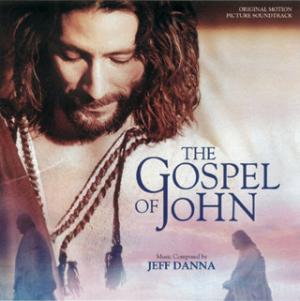************************************************************** EDITOR’s CHOICE January 2004 **************************************************************
The Gospel of John
Music by Jeff Danna
Orchestrated and conducted by Nicholas Dodd
Performed by The Philharmonia Orchestra
Esther Lamandier, mezzo-soprano
Jan Hendrickse: ney and flutes
John Banks: Gothic harp, santuri, & kanun
Hossam Ramzy: drums and percussion
Robin Jeffrey: oud, jouras, lute and laouto
Allan Wilson: shofar; Paul Clarvis: drums and percussion
Stuart Hall: Constantinople lyre
Available On Varèse Sarabande 302 066 530 2 ;
Running Time: 52.55
Amazon UK Amazon US

This is a compelling score that eschews much of the saccharine associated with so many traditional biblical epic scores such as those penned by the likes of Alfred Newman (The Robe, The Greatest Story Ever Told) and Miklós Rózsa (Ben Hur, King of Kings) in favour of something that the producers intended would capture more nearly the spirit of the time of Jesus.
The album notes inform that almost a year was spent in research "in music libraries, sound recording archives, correspondence with Biblical scholars and innumerable searches on the Internet, before composer Jeff Danna and Nicholas Dodd, the orchestrator and conductor, travelled to London and Cambridge, England, to listen to and learn about a variety of musical instruments that originated more than 2,000 years ago."
The ancient instruments used in this score include the unique timbre of the shofar (made from a ram's horn), heard compellingly in "Here Comes Your King" and "Jesus at the Temple". Elgar used this instrument to great dramatic effect in his oratorio The Apostles. More important is the use of the Gothic harp, kanun, oud jouras, laouto (an early lute), and various ancient flutes including the ney flute. This instrument originated in the Middle East and North Africa in the 3rd Millennium B.C.. and was (and still is in Sufi Islam) used to induce states of trance and ecstasy. Also employed is the santuri, a kind of unfretted dulcimer (or early zither) from Turkey and Iran and elsewhere in the Near East.
The vocal soloist Esther Lamandier is a French mezzo-soprano who specialises in realisations of Hebrew music. Here she sings Aramic chants believed to closely approximate those sung in the time of Jesus.
All this scholarship adds considerable verisimilitude, atmosphere and dramatic tension to this superior score. For example, in 'The Ruler of This World' these instruments hold centre stage virtually alone for most of the track's length before the orchestra enters. The opening track, 'For God So Loved The World', states Danna's lovely liturgical theme its basic tender outline familiar from other Passion stories, embroidered with the exotic sound of the ancient instruments. Pointing-up the message of sympathy, understanding and love are mystical elements on high strings and percussion in such tracks as 'The Lamb of God', and the radiant beauty of Ester Lamandier's rendition of 'The Prayer' and the final 'Follow Me'.
As antithesis there is the more menacing music associated with the crushing, oppressive rule of Pontius Pilate; the tortuous intensity of 'Pilate's Dilemma', and the cruel, jarring 'The Betrayal'. Danna also vividly invokes the wrath of Jesus as he scourges the sinners in the temple and the resultant anger of the temple authorities in the cue 'Jesus at the Temple'.
Already in the opening days of 2004, I am happy to report a remarkable new score. I fervently hope this portends better scores this year.
Ian Lace
41/2
Gary Dalkin adds:
This is indeed a remarkable work, refreshingly free of Hollywood Biblical musical clichés old and new. The internationally popular Hossam Ramzy adds considerable power to the score with his expert percussion and Esther Lamandier's wordless vocals range from transcendent beauty to spiritual and earthly pain. Fans of Lisa Gerrard's work with both Dead Can Dance and on scores such as Gladiator may find Esther Lamandier's more classically orientated vocals an inspiring change of focus.
Pitched somewhere between a more orthodox melodic orchestral score and the experiments of Peter Gabriel for The Last Temptation of Christ (though without any electronics), this is music which demands to be heard by anyone who considers modern film scoring stale. Those who noted Hossam Ramzy's collaboration with Peter Gabriel on the score to Rabbit Proof Fence recently may equally be intrigued to hear his work on a more traditionally crafted yet highly musically creative symphonic-ethnic score. How this will eventually stand in comparison to the score for the much more high profile and controversial Mel Gibson release The Passion of The Christ (a film which seems to change its title almost as often as its composer(s)) promises to be one of the more interesting film music discussion points of the year.
Gary Dalkin
41/2
Return to Index